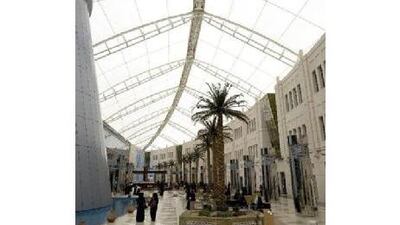ABU DHABI // Fewer women are taking their places at Zayed University as the institution admits men for the first time.
The university was set up for women in 1998, but scholars say enrolling men may have deterred female students.
The number of female no-shows rose from 18 per cent in 2009 to 20 per cent this year in Abu Dhabi, and from 22 per cent to 25 per cent in Dubai.
Conversely, the number of male no-shows at the Abu Dhabi campus has decreased from 45 to 41 per cent. For the first year of enrollment at the new men's campus in Dubai, there was a 40-percent no-show rate.
"The increase in female no-shows of the 1,977 places offered may be a result of the opening of the male facility in Dubai this year and the new Abu Dhabi campus, opening next year, which will bring males and females on the same site, but in separate facilities," said the university's vice-provost, Bryan Gilroy.
"We are investigating why the female no-show rate has increased slightly. It may well be because there continues to be a misconception that male and female undergraduate students share certain facilities and have the opportunity to mix. This is not the case."
He continued: "Male and female students do share facilities: the library in Dubai for example, but at completely different times. Male and female students do not come into contact with each other at any time of the day, nor will they on the new Abu Dhabi campus."
Mr Gilroy added that some women who have not taken their places at Zayed may choose not to attend university at all, while some may decide to go to the Higher Colleges of Technology (HCT). Others, he said, may defer joining Zayed until the spring semester.
"Some may want a break after high school," he said.
Of the improvement in the male no-show rate, he said: "I think this is because the retention rate is improving and the programme is not as difficult as people believed it to be."
A record number of places was offered to students at the three federal institutions in July. The Ministry of Higher Education and Scientific Research granted 13,775 students places for the coming academic year at HCT,the United Arab Emirates University and Zayed University.
Scholarships were granted to 400 students in undergraduate and postgraduate study, and another 10 special-needs students received scholarships to study abroad.
Study at federal universities is free for Emiratis.
At HCT, a new drive to ensure that students take up their places has resulted in a decline in no-shows, according to its provost, Mark Drummond.
Of 8,024 places offered to students, 93 per cent have taken up seats at their colleges around the emirates, taking their numbers to 19,637.
"No-shows were dramatically reduced by a new contact plan we put into place, the idea being that all those students who accepted admittance into HCT were contacted on numerous occasions to ensure readiness to show up for the first day of class. My sense is that paying a lot more attention to new-student orientation and also getting feedback from the students as we go so that we can improve services will also lessen dropout considerably."
According to the most recent figures from the Ministry of Economy in 2005, the northern emirates have the highest rates of male no-shows at university. Fujairah is at the top with 61 per cent, followed by Ras al Khaimah with 55 per cent, Sharjah (53 per cent) and Umm al Qaiwain (51 per cent).
According to 2005 statistics from the National Admissions and Placement Office for Higher Education, the highest number of no-shows, 33 per cent, were men who went to the military and police, while 30 per cent were either staying at home or looking for work. Another 27 per cent attended another institution, 5 per cent went into work and a final 5 per cent travelled abroad to study.
Fatima Abdulla, the managing director of Global Consulting Associates and a research fellow at the Dubai School of Government, said: "It could be argued that one significant factor that is keeping males away from higher education is the lack of perceived or real economic benefits."
Ms Abdulla, who conducted a study on the issue with her DSG colleague Dr Natasha Ridge, added: "The first solution could be government policies that mandate a university degree for career advancement in the military and police forces.
"Poorer emirates tend to have lower exam scores and higher no-show rates at higher education institutions," she said. At the UAE University, 3,364 students were offered places, but it is not yet clear how many students have taken them.

